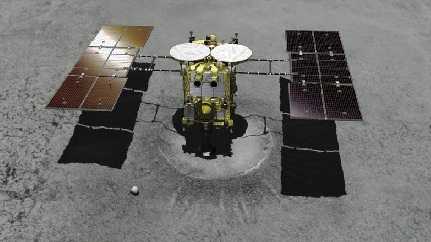
TOKYO, Nov 22 (NNN-NHK) – Japan’s space agency, today said, it has given up on a plan to land its Omotenashi space probe on the Moon’s surface.
The news comes, following the ultra-small, unmanned lander, failing to maintain stable communications with controllers on Earth, and as a result, it was unable to correct its trajectory after its launch last week, sources close to the matters said.
They explained that, the problem became known after the probe, regarded as being one of, if not, the world’s smallest lunar lander, lifted off atop NASA’s Space Launch System rocket, from Kennedy Space Centre, in Florida, last week.
The unstable communication between the probe and its controllers, affected the probe’s trajectory, as its solar panels were kept facing away from the sun, the Japan Aerospace Exploration Agency (JAXA) explained.
JAXA officials attempted to correct the craft’s trajectory, prior to its passing by the Moon and reduce its speed, in a failed bid to land the 12.6-kilogram, box-shaped lander, on the Moon’s surface, at around 11:55 p.m. local time yesterday, the agency said.
Plans for Japan to land its first probe on the Moon’s surface were subsequently scrapped, at around 2.00 a.m. local time on Tuesday, JAXA officials said, with the decision based on there being no improvement in communications with Omotenashi.
Were the lunar landing to have gone ahead as planned, Japan would have been the fourth country to land a spacecraft on the Moon’s surface, after the former Soviet Union, the United States and China.
According to JAXA, Omotenashi will still be used in the future, for other missions already in the pipeline, including measuring levels of radiation exposure in space, among others, but only if the probe’s communication problems can be corrected.




